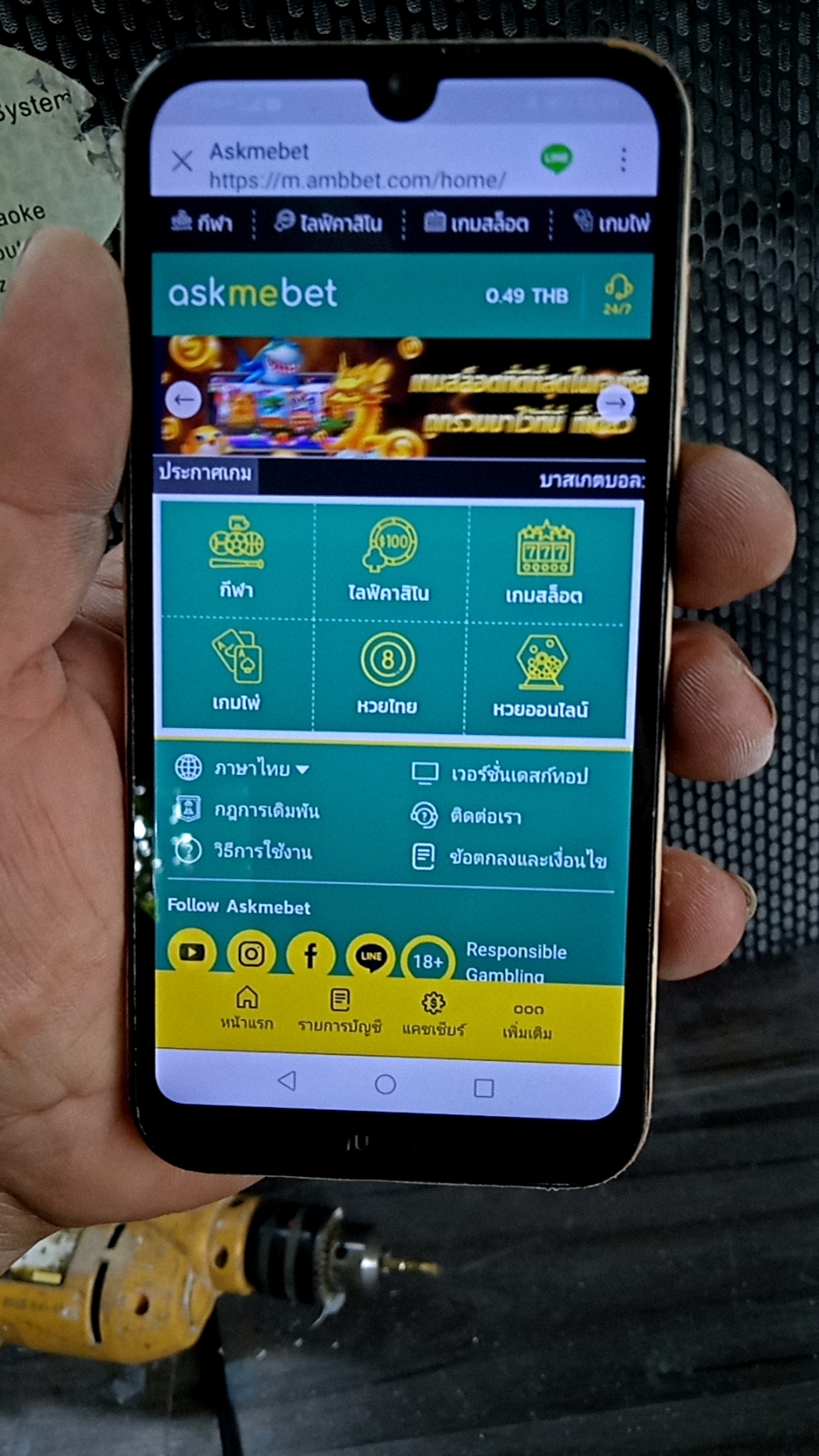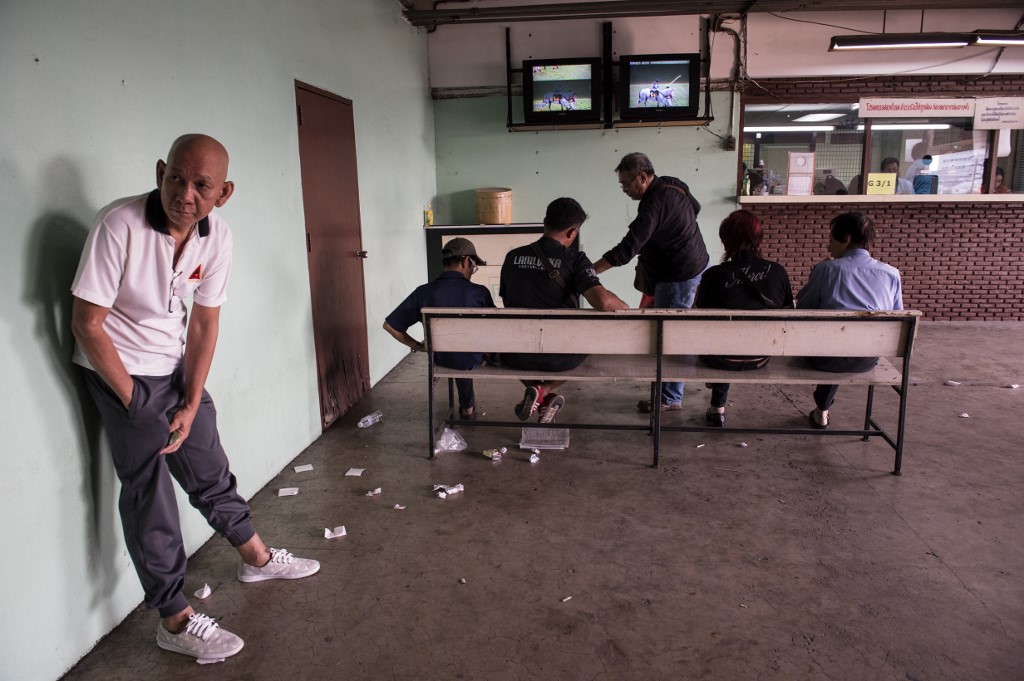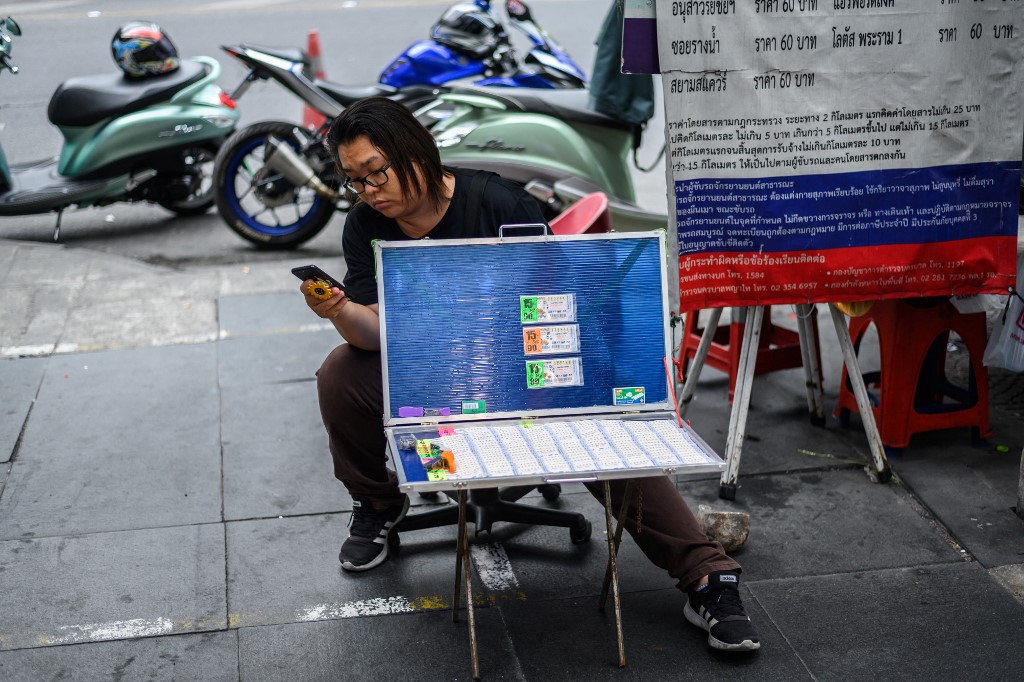Blue or Red. Na ponders the decision on his smartphone before swiping up on Blue.
He made the right choice. A shower of coins bursts onto the screen, complete with the sound of cascading pieces of silver followed by a ding from his mobile banking app informing him the winnings have automatically entered his account. The game restarts and once again he’s left to choose: Blue or Red.
During his midday break, Na often fills his time with online gambling through an app called Royal Casino, one of many such apps available, adding a dash of uncertainty to his otherwise repetitive, day-to-day routine as a construction worker.
“I win most of the time,” Na said. “If I lose, then I’ll just go find more money the next day – but I won’t tell my wife.”
For Na’s friend, Toon, gambling is synonymous with friends and tipsy rounds of the dice game “Hi-Lo”. Unlike Na, he prefers to test his luck in-person with his buddies after the day’s work is done. Since there’s no smartphone app for that, Toon often finds himself behind a facade of roughly six townhouses near his home, where the consecutive second floors have been converted to a makeshift neighborhood casino.
This little makeshift speakeasy, Toon’s regular evening location, is one of about 50 gambling dens hidden across the Bangkok metropolis with the looming threat of being exposed.
“The neighbours called the police. We didn’t see [the officer’s] police identification, but he threatened to tell the police station,” said Toon. “So we just paid them on the spot, otherwise, we could get summoned to court.”
Though arrested, a bribe got him away – scratching the surface of a bigger problem of police corruption, magnified by Thailand’s second wave of Covid-19.
Today, public health officials believe these covert casinos, along with Myanmar migrants making irregular border crossings, have been a significant source of Thailand’s second major outbreak of Covid-19 – a wave that emerged in December, spreading through 63 out of 77 provinces and adding over 22,000 cases to the kingdom’s total of 26,411.
The renewed outbreak starting in December last year was attributed in part to unregulated gatherings in gambling dens, connected to at least 10 public officials in the border provinces of Chanthaburi and Rayong. In that latter province, 83 cases of Covid-19 were linked to an illegal gambling den.
One prominent academic, former Thammasat University lecturer Kaewsan Atipothi, has labelled those running gambling dens along Thailand’s Thai-Cambodia border as the “Covid Mafia”, as state officials and local influential figures have collaborated to keep activities running despite Thailand’s lockdown.

But this public health finding is just the latest point in a much longer running, sometimes heated debate about gambling in Thai society, where the practice has been officially banned for more than 85 years, yet quietly enjoyed by many for just as long in places like the den frequented by Toon.
With the recent no-confidence debate on February 16 against Prime Minister Prayuth Chan-Ocha and nine other cabinet members, among other issues Prayuth received heavy criticism from opposition parties for inadequate management of the industry, and suggestions that he was associated with corruption from illegal gambling. Prayuth denied the claims and insisted that gambling should be “eradicated completely” with over 74,000 to 98,000 people arrested under the Gambling Act between 2018 and 2020.
Back in January, Prayuth admitted that it was hard to stop gambling and is open to holding public decisions about the pros and cons of legalising the practice, first starting with a committee to inspect state officials’ law enforcement in cases of illegal gambling.
But opponents aren’t convinced, and are pointing to the recent Covid-19 infections as yet another reason to fight the spread of gambling. Thanakorn Komkris – secretary of the Stop Gambling Foundation, an organisation with a fairly clear agenda – is one such critic of legalisation.
“We should create a [gambling] vaccine to protect people in society, to make citizens able to live along with gambling, when each individual has a strong immunity against it,” Thanakorn told the Globe. “If we don’t take any action, we will continue to have problems in this aspect.”
Illicit practices and corruption go hand-in-hand with Thai gambling, which today is almost entirely done under the table. Thailand has long maintained the Gambling Act of 1935, which completely bans casinos and other, similar forms of cash gaming. The exceptions to this are the state lottery and betting on horse races within one of the country’s six designated racecourses. The current regulations have not caught up with online gambling and apps, which hop in between the blurred lines of gambling and gaming, using VPNs to circumvent restrictions.
Still, there’s no secret that the underground gambling scene in the kingdom is as vibrant as ever. The Centre for Gambling Studies, a research institution at Chulalongkorn University funded by the Thai Health Promotion Foundation, estimated in 2019 more than 30.4 million Thais, roughly 57% of the population, were involved in some form of gambling. The number of gamblers had also increased by 1.4 million people since the survey started in 2017, with the most popular forms of gambling being the state-run lottery, underground lotteries and betting on football matches.
Rattaphong Sonsuphap, a political economist at Rangsit University’s College of Social Innovation outside Bangkok and a researcher at the Centre of Gambling Studies, notes the Thai government’s current approach is to fight gambling as a crime. That’s been mostly ineffective, he says, given the reality that the industry is flourishing.
“The Thai government places greater emphasis on combating gambling rather than accepting the truth of the present moment and providing knowledge to deal with the situation,” said Rattaphong. “The reality being that gambling in 2021 is a booming business, with a large demand and corresponding supply.”
Along Thailand’s borders, the Centre of Gambling Studies observed three casinos in Laos, five in Myanmar, and 23 in Cambodia. Before the pandemic, Rattaphong estimates the casinos in Myanmar had $1.6 million circulating per day. Based on his research, Rattaphong estimates the border casinos were generating more than $1.32 billion annually based on his research.
Even though all of the casinos are outside Thailand, they’re well-known to operate mainly in Thai Baht. According to Rattaphong, as many as 90% of the gamblers are usually Thai.
Ben Lee, founder and partner of gaming consultancy IGamiX, a firm based in Macau, said the demand for gaming in and near the Kingdom is clear.
“The Thais are very keen gamblers, evident from the number of casinos all around Thailand’s border,” Lee said.

Legalising casinos within Thailand has been repeatedly suggested over the years, but has consistently been rejected on the basis of ethical or religious reasons. Thailand is a predominantly Buddhist society and gambling is perceived as a vice.
Even discussing the issue publicly can be controversial, Rattaphong says.
“The government’s mindset is to deny the gambling and not bring it to the light,” he said. “With Thai society being Buddhist, the elites will face opposition, before or after covid.”
Earlier proposals to legalise gambling have stopped short before entering into discussion in parliament. After the 2003 tsunami, Thaksin Shinawatra proposed legalising casinos and entertainment complexes to revive the economy, but those plans were shot down before they could be realised. Similar attempts were made in later governments led by Samak Sundaravej and Yingluck Shinawatra, both regarded as Thaksin’s proxies and equally unsuccessful in changing the gambling regime.
Above parliament, the late King Bhumibol did not allow for legalised casinos under his reign.
“The biggest barrier, apart from the local community, was the previous King – he was against gambling,” Lee said.
The Buddhist attitude towards the sex industry has always been one of tolerance, but when it comes to gambling, it is something else
Even while gambling remains in the dark, other historic vices have been gradually approved for tolerance, or even legalisation. In January, lawmakers approved hemp and cannabis for commercial growing, paving the way for a new cash crop that has once been controversial.
Lee compares the gambling industry to the sex industry, a large, if little-acknowledged part of Thailand’s tourism market, to demonstrate the special place gambling holds in the field of public morality.
“The Buddhist attitude towards the sex industry has always been one of tolerance, but when it comes to gambling, it is something else,” Lee said.
However, today the debate on legalising casinos is placed in a new context, both in the unsteady political and socioeconomic world of the pandemic, as well as being discussed for the first time under the reign of King Vajiralongkorn.
“During Covid, the many [Covid-19] cases from Rayong shows that the government is focused on combating gambling, but is not completely successful – and that the cost of combating is high,” Rattaphong told the Globe.
“The important variable is that political parties are now starting to speak up and calling for change. Beforehand, this topic was rarely brought up in parliament because the public opinion outside of parliament is strongly against it.”
Rattaphong continued, noting the shift in public opinion since the gambling-linked Covid cases.
“In recent times, the poison of Covid has made these voices louder, have more space, and people are more courageous to voice their opinions. This is a development in Thai society,” he said. “If we legalise gambling, it will allow the government to reap the benefits. That has never been possible officially before.”

As tourism-happy Thailand struggles to boost its pandemic-era economy, the gambling debate has found new life – including in the halls of the Thai parliament, where a new political party known as Kla, brave in Thai, has proposed ideas for legalising and regulating the potentially lucrative industry.
The more vocal political front is led by former finance minister Korn Chatikavanij, who is now pushing for gambling reform.
“[Prayuth Chan-Ocha] has said that 100 prime ministers would not be able to [eradicate gambling] if he does not receive help from the citizens,” Korn shared on the party’s Facebook page. “I would say 1,000 prime ministers would not be able to do it if the issue or goal is to make people stop gambling.”
With that kind of uphill battle in mind, Korn wants to reframe the issue altogether.
“Our society should set a new problem statement. The problem should be how to make gambling not harmful to society,” he said in the statement.
Both Lee and Rattaphong have pointed to Singapore as a potential model for Thailand. The wealthy city-state features the gleaming Marina Bay Sands as an alluring entertainment complex able to limit the impact of gaming on the local community while attracting international tourists.
Las Vegas Sands, the world’s largest casino company and an investor in Marina Bay Sands, has already signaled an eagerness to invest in the Thai market.
“[Singapore] is using the whole integrated resort concept to increase their tourist appeal,” Lee said. “[Singapore’s] model could fit Thailand and a population that is predominantly Buddhist and anti-gambling. You can minimise the negative and maximise the positive.”
The way Lee and other gaming advocates see it, the positives would neatly tie into Thailand’s reigning status as a tourism pillar of the region.
“The elephant in the room is Thailand,” Lee said, ticking through the competing tourism markets in the region, nearly all of which have legal gambling. The kingdom already attracts more than 40 million tourists annually with great volume and diversity before the pandemic, and boasts a large, service-oriented and fairly prosperous population.
“Thailand has the combination of all the different factors that are absent from a lot of those [other regional] markets,” Lee said. “Thailand has all the factors in place for a dynamic gambling market, if they choose to allow gambling.”
With that in mind, he thinks that if the state were to take their chances on gambling, Thailand could very well become “the single biggest tourist attraction in the whole of Asia”.
Though Thailand may have an ace up its sleeve, critics still aren’t convinced. Those like Thanakorn and others at the Stop Gambling Foundation say any legalisation of gambling would only accelerate the growth of what they see as an inherently harmful industry.
“If we allow [Thailand] to have legal casinos, it equates to that we are accepting society to have an extreme form of gambling,” Thanakorn said. “It creates legitimacy for it and a societal norm in which this is acceptable. Amongst those concerns, underground gambling and police corruption will still be rife – it’s not solving problems.”
Toon, the regular dice thrower at small urban gambling dens, believes legalising casinos wouldn’t have a large impact on the underground scene. Those like himself, he said, prefer to keep things off the record, and some services may continue to fill that niche.
“Things in the dark won’t gravitate towards the light,” Toon said. “But maybe it could help with getting caught with the police.”
He paused, thinking, before adding, “well, illegal dens are more forgiving for stealing a little”.
It’s human behaviour and it’s simply impossible to combat gambling. Therefore, we have to adapt the policy to fit with the reality of the current situation
Less flexibility with the house rules is just one small cost of going legitimate.
But it would be necessary for any legalisation scheme, which would be expected to provide a quick boost for the country’s battered economy as it recovers from the pandemic era.
Despite the future of gambling in the country, the present situation is clear in that gambling remains nearly impossible to fully eliminate in Thailand. Though the opposing sides of the age-old debate are still at odds on what the government should do, both see that changes need to be made.
For political economist Rattaphong, that means conceding that gambling is here to stay.
“It’s human behaviour and it’s simply impossible to combat gambling. Therefore, we have to adapt the policy to fit with the reality of the current situation,” Rattaphong said. “Instead of seeing the negatives, we can see the positive. There are both sides. From seeing it as a negative, we can turn to the positives – and manage and regulate it.”


